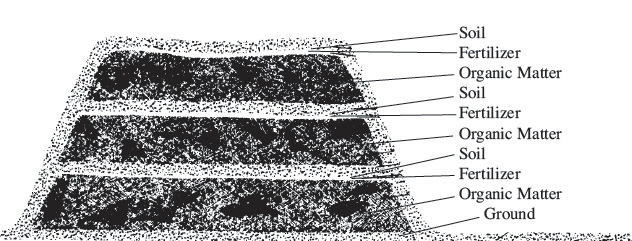Composting
Compost Improves Soil Structure
Compost is partially decomposed plant material mixed with soil. Since compost is rich in organic matter, use it to improve soil structure, tilth, fertility, and water- and nutrient-holding capacity. Compost can be mixed directly into the garden soil or used as a mulching material that is mixed with the soil after the growing season.

The biggest benefit from compost is its value as a soil conditioner. Compost increases the water-holding capacity of soil, reducing the frequency you need to water. Adding compost improves sandy and clay soils. Plant growth nutrients in compost include nitrogen, phosphorus, and potassium. They are mostly in an organic form, and they release slowly and are less subject to leaching.
Compost is something you normally make rather than purchase, but composted bark and composted manure are frequently sold as soil conditioners.
Make compost from vegetable and other plant materials from normal yard chores, leaves, and grass clippings, or hauled-in materials like sawdust, straw, or hay.
Construct a pile of alternating layers of organic waste material and soil. Keep the pile moist and add a mixed fertilizer to speed the composting process.
Build your compost pile in some out-of-sight location. It can be built on open ground or in a bin made of cinder block, rough boards, or wire fence. The sides of the bin should not be air- or water-tight. Spread a layer of organic matter about 6 inches deep and add 1 cup of a mixed fertilizer, 6-8-8, to each 10 square feet of surface. Then add 1 inch of soil and enough water to moisten but not soak the pile. Repeat this process until the pile is 4 to 5 feet high.
Make the top of the pile concave to catch rainwater. Under normal conditions, turn the pile in 2 or 3 weeks and again in 5 weeks.
Heat helps decomposition, so if the compost pile is made in the fall, decomposition will be slow until spring and summer. Moist, green plant materials and fresh manure decompose much faster than dry, brown materials and can produce a considerable amount of heat.
See Extension Publication 1782 Composting for the Mississippi Gardener for more information.

